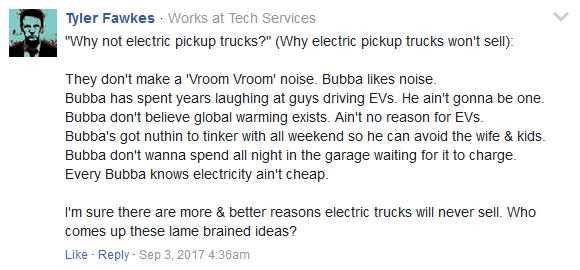In Europe, pickup trucks have never been particularly popular. There is the VW Amarok, and in the GDR the pickup-like Wartburg 353 was built and Peugeot also had some models on offer. Currently, however, almost exclusively Japanese manufacturers are building pickups for the European market. This type of truck was never really a success with us. It is no wonder that no German car dealer is officially working on electric pickup trucks, at least not for the local market. But even in the country of pickups, the USA, the electric pickup is not a success either.
Americans love pickups – with gasoline
This question of where are the electric pickups was recently dealt with by the Washington Post in an article, with some interesting insights.
If you look at annual US car sales statistics, you will soon realize that Americans love their pickup trucks. They stand for freedom and solidarity and are part of the national image, just like hot dogs and the Super Bowl.
Not only in the country, but also in the city, Americans drive a lot of trucks. In 2016, pickup sales rose 6 percent. A clear leader in sales statistics is the Ford F-Series. But these trucks all have one thing in common: they run on gasoline. Diesel had a bad reputation in the USA even before Dieselgate.
However, while sales figures for electric vehicles in the US have risen rapidly – from January to May 2017, 46.2 percent more e-vehicles were sold in the US than in the same period last year – this does not apply to pickups.
Electric pickups as workstations
At least not yet. Various American car manufacturers, from Tesla to Workhorse to Ford, have announced they will roll out electric pickups in the coming years. Actually, Pick Ups would be ideal for an electric drive. Owners could use their small trucks not only as a vehicle but also as an electrical workstation. The connection of electrical tools, from the drill to the chainsaw, would thus not be a problem even away from civilization. And, of course, the change from non-low-emission pickups could greatly relieve the environment, as the Baker Institute for Public Policy at Rice University suggests in a recent study.
This all sounds good in theory, but in practice, it is more complicated. Because with an electric pickup, quite different questions arise than with a small electric city car.
Range
There is, as always with electric cars, the delicate question of the range. “That’s a big deal for trucks because you’re dragging something or carrying a big load!” This is what Steve Burns, the CEO of Workhorse, explains to the Washington Post. Thus, when consumers are already thinking about the range in a small car, these concerns are even greater for pickups. The off-road vehicles are, of course, mainly used to transport heavy loads. However, the more weight an electric vehicle is carrying, the more battery power it needs – and the more range it loses.
No matter whether you are transporting tools for work, hay bales or bicycles, or furniture for the move: pickups are bought because they can take big loads. If this advantage is lessened by the shorter range, automotive groups have a sales problem.
Off-road trips must be safe
Of course, car manufacturers are working hard on solutions to this problem. Tesla is allegedly still this month to present its version of an electric semi-truck.
But it is questionable whether manufacturers can solve another problem with for pickups: safe driving in off-road terrain. This is where the vehicles are used particularly often. In the past, Tesla had problems with the durability of its floor on the Model S – something which is of course a bigger problem on uneven ground and therefore has to be taken into consideration during the construction phase, especially when heavy loads will be carried on the trucks. Because no one wants to be stranded when their truck breaks down in the middle of nowhere.
Too expensive?
However, even if all these aspects can be solved, electric pickups will have a hard time. They still cost more than comparable petrol engines. In the long term, however, they could save money for the users, experts say. In some cities and US states, there are tax credits for the purchase of an electric vehicle, and in the long term, electric cars are even cheaper, as researchers at Stanford University explain. However, long-term benefits must first come to the attention of consumers, which is often more difficult to see than the direct financial advantage.
And then there are also some “cultural” reasons that could deter a typical pick-up driver from buying an electric vehicle, as this Facebook user notes.











